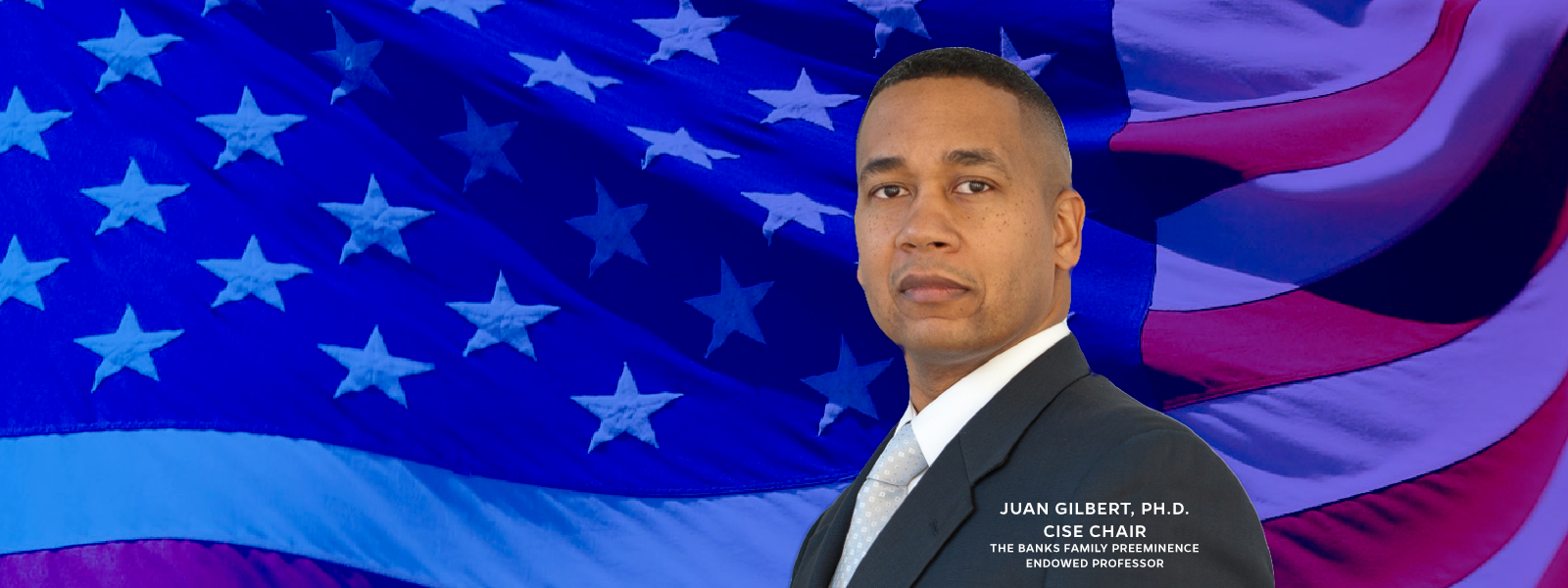Juan E. Gilbert, Ph.D., The Banks Family Preeminence Endowed Professor, testified as an expert witness regarding election security during a hearing by the House Administration Committee earlier this month. Dr. Gilbert, who has been conducting research on elections for more than 15 years and who was one of two academics asked to testify, shared his expertise in voting system security, accessibility and usability.
Dr. Gilbert, chair of the Department of Computer & Information Science & Engineering at the Herbert Wertheim College of Engineering, shared with the Committee some key recommendations from the 2018 National Academies of Science, Engineering and Medicine consensus report titled, “Securing the Vote: Protecting American Democracy” He was a member of the committee that authored the report.
“In the academies report, we recommended that we have a national center to do research around [securing elections],” he said. “That is a necessity.”
In 2003, Dr. Gilbert and his research team developed the “first open-source universal design” voting system that accommodates persons with and without disabilities and provides a paper printout of the ballot. His design preempts the separate-but-equal connotation of asking only persons with disabilities to use a ballot-marking device.
“If we were to design these machines so they’re only used by people with disabilities, an adversary finds that as a happy day because all they have to do is target a specific group,” he said. “Universal design, meaning more people using those machines, gives you greater security. The likelihood of catching errors increases as a result of that.”
Dr. Gilbert also addressed the issue of voter verification as a primary means of enhancing election security. He emphasized that recent studies did not find that voters could not verify their ballots, only that they did not and that simply reminding voters to take this step increased verification by as much as 70%. Gilbert announced that later this year his team at the University of Florida will introduce a “transparent voting machine” that addresses the issues of verification by all users, further enhancing election security.
“Securing the Vote” was the result of a two-year National Academies’ study conducted by experts from elections administration and policy, cybersecurity, accessibility, and law. Over the course of the study, the committee reviewed extensive background materials. It also held five meetings where invited experts spoke to the committee about a range of topics including voter registration, voting accessibility, voting technologies and market impediments to technological innovation, cybersecurity, post-election audits, and the education and training of election workers.
The Academies’ report recommended that elections be conducted using human-readable paper ballots. It said that these ballots could be marked by hand or by machine, using a ballot-marking device and that they may be counted by hand or by machine, using an optical scanner.
“Currently, there is no known way to secure a digital ballot. At this time, any election that does not employ paper ballots cannot be secured,” Dr. Gilbert said. “Therefore, the report recommended that Internet voting, and specifically the electronic return of marked ballots, should not be used at this time.”
House Administration Committee Chairperson Zoe Lofgren commended Dr. Gilbert on the presentation of the report’s findings and the excellent work done by the National Academies. She noted that the report was “the guts of what we ended up putting in our SAFE [Securing America’s Federal Elections] Act that’s now pending in the Senate.”
Dr. Gilbert concluded in his testimony that, “As a nation, we have the capacity to build an elections system for the future, but doing so requires focused attention from citizens; federal, state, and local governments; election administrators, and innovators in the academy and industry. It also requires a commitment of appropriate resources.
“Representative democracy only works if all eligible citizens can participate in elections and be confident that their ballots have been accurately cast, counted, and tabulated.”
Allison Logan
Marketing & Communications Specialist
Herbert Wertheim College of Engineering
